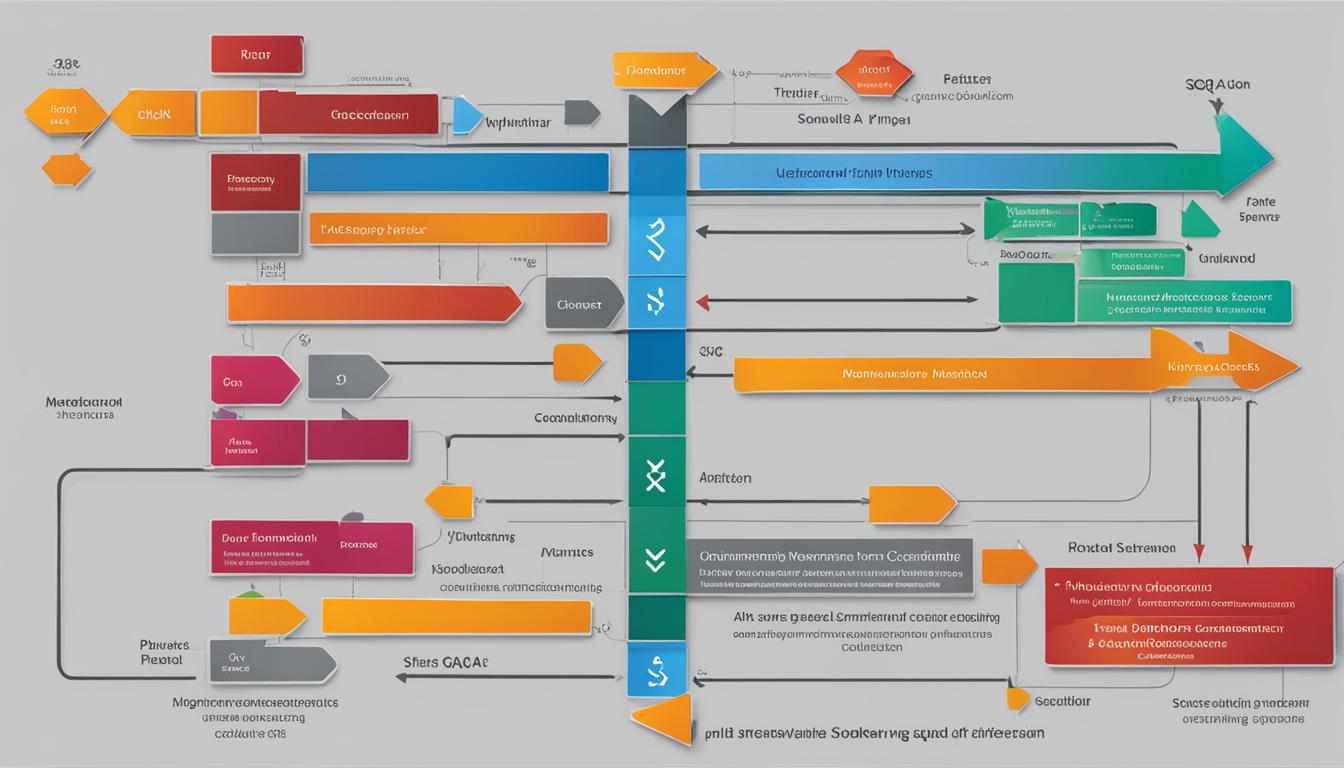In an era of constant technological progress, the demand for software quality assurance engineers and testers is anticipated to significantly rise, akin to flowers blossoming in the spring. Imagine this: a projected growth of 25% in job opportunities from 2022 to 2032. It is evident that individuals seeking a career in this field will likely find bright prospects ahead.
This growth is not merely a result of happenstance but is driven by tangible factors such as the surging need for software development in emerging technologies like artificial intelligence, the Internet of Things, and robotics.
As we delve into the intricacies of this growth, it becomes evident that the future of software quality assurance engineers and testers holds promising opportunities that extend far beyond the confines of traditional testing methodologies.
Key Takeaways
- The employment of Software QA Engineers is expected to grow by 25% from 2022 to 2032, driven by the demand in emerging technologies such as AI, IoT, and robotics.
- There will be an increased need for QA engineers and test automation specialists, highlighting the importance of mastering QA automation tools and techniques.
- Testing AI-driven systems and diverse environments will be crucial to the QA engineer’s role.
- The software testing industry will experience rapid growth and abundant opportunities, particularly in the fields of AI, machine learning, IoT, and cybersecurity.
Projected Growth of Software QA Engineers
The projected growth of software quality assurance engineers and testers over the next decade is expected to reach 25%, driven by increasing demand in artificial intelligence, Internet of Things, and robotics. As quality assurance professionals, we must strategically prepare for this surge by focusing on integrating automation into software testing. With the expansion of software development in artificial intelligence, the need for QA engineers and test automation specialists will escalate. We must stay ahead by mastering QA automation tools and techniques to accommodate the evolving landscape of software quality assurance.
The demand for software testing in the realm of artificial intelligence calls for a deep understanding of complex algorithms and intricate data processing. As QA engineers, we must proactively enhance our skills in testing AI-driven systems, ensuring that they meet the highest standards of quality. Additionally, the proliferation of Internet of Things and robotics necessitates a comprehensive approach to QA, emphasizing the importance of meticulous testing in diverse environments.
In essence, the projected growth of software QA engineers presents an opportunity for us to lead the way in shaping the future of software quality assurance. By embracing automation and mastering the intricacies of software development in emerging domains like artificial intelligence, we can solidify our position as indispensable assets in the evolving tech landscape.
Factors Driving Demand for Testers

With the increasing reliance on software products for business operations, the demand for reliable and working software is propelling the need for skilled software testers and quality assurance engineers. Several factors are driving the increased demand for testers:
- Companies are seeking professionals who can rectify failed software releases and enhance IT systems, leading to a growing demand for software QA engineers.
- The goal of delivering high-quality products to customers and the imperative to avoid errors in software engineering processes are fueling the demand for software testers and software QA engineers.
- As organizations concentrate on delivering high-performance software that saves time and money, the demand for software testers and software QA engineers will continue to rise in the future.
The increasing complexity of software, the rapid pace of software development, and the proliferation of automated testing, artificial intelligence, and machine learning are also contributing to the demand for testers. As developers strive to meet the escalating expectations for software quality, the need for skilled testers and quality assurance engineers is expected to grow by 25% in the next 10 years.
This trend underscores the critical role that software testing and quality assurance play in ensuring the reliability and functionality of software products.
Career Opportunities for QA Engineers
Experiencing rapid growth and abundant opportunities, pursuing a career as a quality assurance engineer promises an exciting and impactful journey in the dynamic landscape of software development.
As software continues to evolve and permeate every industry, the demand for skilled QA engineers and testers is on the rise. The increasing complexity of software, particularly in emerging fields such as artificial intelligence and machine learning, necessitates rigorous testing and quality assurance to ensure optimal performance and user experience.
This trend opens up diverse career paths for QA specialists, allowing them to work on cutting-edge technologies and collaborate closely with software developers to enhance product quality.
Furthermore, the proliferation of IoT-connected devices and the growing emphasis on cybersecurity present new avenues for QA engineers to contribute meaningfully to the software development lifecycle. With approximately 153,900 job openings projected annually, the landscape for QA engineers and testers is filled with potential for professional growth and advancement.
As technology continues to advance, the role of QA engineers will become increasingly pivotal, offering rewarding opportunities for those seeking a challenging and impactful career in software testing and quality assurance.
Future Trends in Software Testing

As the demand for skilled QA engineers and testers continues to rise, future trends in software testing are poised to revolutionize the industry through advancements in AI, machine learning, test automation, blockchain technology, and the integration of agile methods and DevOps practices.
- AI and Machine Learning: These technologies will automate processes, identify bugs, and provide intelligent insights to enhance the overall testing process.
- Test Automation: The continued growth of test automation will lead to reduced costs, increased efficiency, and faster time-to-market for software products.
- Blockchain Technology: This will impact software testing by automating tasks, ensuring data security, and verifying the authenticity of transactions and data.
The integration of these trends will require QA specialists to adapt and expand their skill sets to effectively leverage these advancements. Furthermore, the use of testing tools for API testing, automation testing, and security testing will become even more crucial as software development becomes increasingly complex and interconnected.
Demand for Software Testers
What factors are driving the increasing demand for software testers in today’s technology-driven industry? The demand for software testers is on the rise due to the growing complexity of software applications, the increasing reliance on technology in various sectors, and the need to deliver high-quality products to the market. As companies strive to meet the ever-growing expectations of users, the role of software testing and Quality Assurance (QA) becomes paramount. Additionally, the emergence of new technologies, such as artificial intelligence, has not replaced the need for manual testing but has, in fact, augmented the need for skilled professionals who can harness these tools effectively.
| Factors Driving Demand for Software Testers | Description |
|---|---|
| Complexity of Software Applications | As software becomes more intricate, the need for rigorous testing grows. |
| Increasing Reliance on Technology | Organizations across industries are heavily dependent on software products, intensifying the need for thorough testing. |
| Embracing New Tools and Technologies | The adoption of new testing tools and artificial intelligence has expanded the scope of software testing. |
The demand for software testers is expected to become even more pronounced in the coming years as companies continue to recognize the pivotal role that QA and testing play in delivering reliable and high-quality products to the market.
Frequently Asked Questions
What Is the Future of Quality Assurance Engineer?
The future of quality assurance engineers is promising, with a projected 25% growth in employment from 2022 to 2032. As software development expands into areas like artificial intelligence, Internet of Things, and robotics, the demand for skilled testers will rise.
With organizations prioritizing computer security and increased investment in software development, opportunities for quality assurance engineers will abound. The widespread use of software in consumer electronics and IoT-connected devices further solidifies the bright outlook for our profession.
What Is the Future of QA Tester?
We anticipate a 25% growth in software quality assurance analysts and testers from 2022 to 2032.
This upward trend is fueled by the increasing demand for software development in areas like artificial intelligence and robotics.
As AI and machine learning continue to expand in the industry, the automation of processes and bug identification is becoming more prevalent.
This points to a promising future for QA testers amidst the evolving landscape of technology.
What Is a Job Outlook for Software Engineers in the Next 10 Years?
The job outlook for software engineers in the next 10 years is highly promising. With the increasing demand for software development in emerging technologies like artificial intelligence, Internet of Things, and robotics, the field is projected to grow significantly.
Additionally, organizations’ heightened focus on computer security and the expanding use of software in consumer electronics and IoT-connected devices will create new opportunities for software engineers.
What Is the Outlook for Software Quality Assurance Engineers?
The outlook for software quality assurance engineers is promising. The projected 25% growth from 2022 to 2032 indicates substantial job opportunities.
Factors such as increased demand for AI, IoT, and robotics software and organizations’ focus on security will drive this growth. The expanding use of software in consumer electronics and IoT-connected devices will further boost demand.
This signifies a significant and dynamic career path for software quality assurance engineers.
Conclusion
In conclusion, the demand for software quality assurance engineers and testers is set to skyrocket in the next decade. As technology continues to advance, the need for skilled professionals to ensure the quality and security of software will only increase.
Ironically, as automation and AI become more prevalent, the human touch of QA engineers will be in even higher demand. So, if you’re looking for a secure and growing career, software testing may be the way to go.









